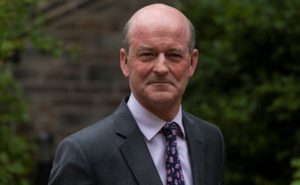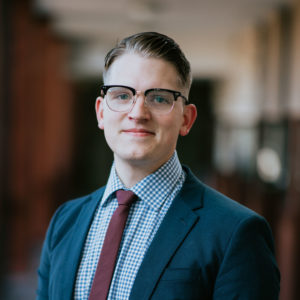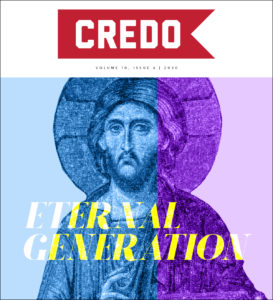If there is a true “renaissance man,” David Fergusson deserves the title. It would simply be one more title added to an already very long list: Ordained Minister in the Church of Scotland, Professor of Systematic Theology at the University of Aberdeen (1990-2000), Fellow of the British Academy, Fellow of the Royal Society in Edinburgh, Officer of the Order of the British Empire, Dean of the Chapel Royal, Dean of the Order of the Thistle, personal chaplain to the Queen, Professor of Divinity at New College in the University of Edinburgh (where he also served for a stint as Principal), and in April 2021, he will take up his post as Regius Professor of Divinity at the University of Cambridge. Any interview with someone so credentialed is a delight, but what makes this interview with Dr. Fergusson such a treat is not his many impressive accomplishments, it is rather the penetrating ray of humble wisdom that shines through. In this interview, David Fergusson shares his insights (hard-earned over decades of faithful ministry in the academy) with Credo readers on topics such as the future of higher education, the relationship between Scottish and Dutch Reformed theology, and being faithful in an increasingly secular age.
As you look over your career up to this point, what have you enjoyed most about teaching and writing theology?
The interaction with students at all levels has been the highlight of my career. I would say however that, with the passage of time, I’ve become less effective as a teacher of undergraduates and a bit better as a supervisor of doctoral students. Age and experience have enabled me to offer guidance to those writing PhD theses, but have distanced me from those much younger. At least that’s my impression, though you’d need to ask the students for corroboration! But I still appreciate the enthusiasm and interest in the subject amongst undergraduates, and it’s encouraging to see their readiness to tackle difficult texts. Writing theology has also been a privilege, especially when this results in an international readership and reception. My two most productive periods have been during times of research leave in Princeton when I was released from other university commitments.
In light of your experience, how do you assess the current state of affairs for Christian higher education? Anything you’d like to see change in the future?
It’s difficult to comment with authority on much beyond one’s own immediate context. In Scotland, I have been dismayed at the steep decline in the number of ordinands. From a position of dominating the student body in the Divinity Faculties of Scotland, they are now in a very small minority – less than 5%. On the other hand, there are probably more people studying and teaching theology in the UK than ever before. This reflects the strength of world Christianity and the wider societal interest in religion. Both will be important factors in the way theology is pursued in the next generation. But I also hope for a recovery in our local forms of church life that will include a commitment to the study of theology in our universities. The links between church and academy have always been important to me. I hope for a recovery in our local forms of church life that will include a commitment to the study of theology in our universities. The links between church and academy have always been important to me. Share on X
Your research has focused a great deal on Scottish reformed theology. How did that become a point of interest for you?
Having taught courses on Scottish theology and philosophy for over thirty years, I’ve frequently lamented the absence of a good textbook. At one time, I thought that this might become a major project for me. But, given the diversity of the field and the multiplicity of experts, it dawned on me that the wiser approach was to edit a multi-volume collection on the history of Scottish theology. I was fortunate to discover that Mark Elliott, now in Glasgow, was thinking along similar lines. Our co-edited three volume History of Scottish Theology was published in 2019 by Oxford University Press. Comprising contributions from over 70 authors, it’s the culmination of five years of fruitful collaboration.
Often Scottish reformed theology is pitted in stark contrast with the Dutch reformed tradition. To what degree is this contrast fair or unfair and how would you compare the two traditions?
Although this contrast has some plausibility, it holds only with respect to modern theology. I’ll try to explain briefly. From the Reformation to the eighteenth century, the trade routes between the east coast of Scotland and the Low Countries ensured a lively commerce of ideas, particularly in the seventeenth century. Many leading Scottish divines studied or lived in exile in Holland, including John Forbes of Corse who married Soote Roosboom, a woman from Middelberg. Dutch textbooks were used in the theology and philosophy curricula of the Scottish universities.
After about 1860, however, our theology became more influenced by developments in Germany and Switzerland with the annual “Scottish caravan” of students studying in the leading universities there. This continued for more than a century. These Scots generated translations of Schleiermacher, Ritschl, Barth, Heidegger and Bultmann. To this extent, Scottish Reformed theology displayed more affinities with German/Swiss liberalism and dialectical theology, especially that of Karl Barth. T. F. Torrance, arguably the leading Scottish theologian of the last century, was the most distinguished pupil of Barth from these shores. This focus resulted in a reduced attention to Dutch Reformed theology, though contacts were maintained through ecumenical bodies. I might add that my Edinburgh colleague James Eglinton is now the leading UK specialist on Dutch Neo-Calvinism. His recently published intellectual biography of Herman Bavinck is a landmark study (and you can listen to an interview with him on the Credo Podcast as well!).
The doctrines of creation and providence are sometimes taken for granted by Christians today. Why should Christians carefully consider these two pillars of the Christian faith?
I tend to think that although these are taken for granted, we do not pay them sufficient attention. The doctrine of creation has suffered from being perceived as merely an account of how the world started, with the consequence that we move too quickly to the story of sin and redemption. This may reflect the heightened awareness of Genesis 1-3 in the popular Christian imagination.
But there are other Scriptural resources on creation that we tend to neglect, especially the wisdom literature. By attending to these, we can develop a stronger sense of the good creation as our home which we share with other creatures. This deserves greater focus in the church’s liturgical calendar. To my mind, the problem with divine providence is that it has tended to be handled in a rather top-down, deterministic fashion under the first article on God the Father. I’ve sought to argue for a more “distributed” approach that sees the diversity of the providential works of God; these include the foolishness of the cross and the mutual interaction of the Holy Spirit with creation.
How might Christians benefit specifically from a Reformed doctrine of divine providence as they consider how to live the Christian life?
In my recent monograph on providence, I’ve criticized some aspects of the traditional Reformed approach, though I stress that these weaknesses are common to the western churches and are not the invention of Protestantism. But there are also significant strengths in the tradition. These include the pastoral dimension of the theology of providence – it was intended to console, to reassure, and to energize Christians. At its best, it succeeded in doing so. The metrical Psalms convey the existential significance of providence by celebrating the overarching love and protection of God amidst perplexity and struggle. I would argue for an attitude of ‘critical support’ towards civil society and the state. Each church needs a social theology, though this will be shaped in part by its history and context. Share on X
You have served as a Chaplain to the Queen in Scotland and Dean in the Chapel Royal and the Order of the Thistle. What has this been like?
The Deanship of the Chapel Royal is an honorary role that involves ceremonial duties when the Queen is resident in Scotland. And, as Dean of the Order the Thistle, I conduct services for the Order once or twice each year. Though these are not onerous tasks, they have proved immensely enjoyable and stimulating. The Queen has a strong Christian commitment. When residing at Balmoral, she attends weekly worship within the Church of Scotland. I am honored to have been appointed by her to serve in this capacity.
Having served in such roles, you have likely given the Church’s relationship to civil government some thought. What insight might you share on the relationship between church and state?
I would argue for an attitude of “critical support” towards civil society and the state. Each church needs a social theology, though this will be shaped in part by its history and context. The Church of Scotland has been a national church by virtue of its territorial coverage, parish organization, and relationship to government. But with increased secularization and pluralism, its situation has altered significantly. More than 50% of the population now identify as belonging to “no religion.” Church affiliation is no longer a matter of obligation but more one of consumption. The consequence of this shift, evident from the 1960s is that the “national” identity of the Church of Scotland has changed in many ways, though it has not disappeared.
Secularism, atheism, religious pluralism—these are but a few of the challenges Christians face today, whether they are living in the United States or Scotland. What encouragement might you give to Christians and churches wrestling with how to present their faith in this world?
There is an inevitable sadness in our churches at the loss of numbers, particularly amongst younger generations. We can lament this but without pretending that there was a golden age of church life. As a minority church in a changing social context, there are opportunities for fresh patterns of mission, worship and theological activity. And, in supervising gifted and committed doctoral students from overseas, I’m constantly reminded of the vitality of the church in other parts of the world.
For our readers unfamiliar with life in Scotland, what is it about Scotland that makes you feel at home?
Having been born and raised in Scotland, I’ve not thought much about that question. Apart from three years as a student in Oxford and two periods of research leave in Princeton, I’ve lived and worked in Scotland all my life. Next April, however, I take up the Regius Chair of Divinity in Cambridge. This is an exciting late career opportunity for me in a different context and with new colleagues and students. Though we’ll miss the Scottish hills, there is much for us to look forward to in the time ahead.



